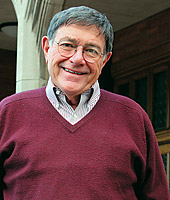 |
|
Spring 2008 | Volume 31, Number 1
| Campus
|
|
|
Palmer’s Secrets for Preaching Great Sermons
Wisdom of a lifetime

Earl Palmer: “One of the great preachers of our time.” |
“I tried to convert my whole family in one weekend,” the Reverend Earl Palmer confessed during Seattle Pacific University’s Church Leaders’ Forum this fall, thinking back on his early days of faith.
The admission prompted laughs from an assembly of preachers, laypersons, and pastoral interns who know the challenges of sharing the gospel with non-believers as well
as teaching the Bible to Christians who want to grow in their faith. Palmer then proceeded to describe what he’s learned over a 50-year career about delivering great sermons instead of Sunday morning snoozers.
Palmer, the retiring senior pastor at Seattle’s University Presbyterian Church and former pastor at First Presbyterian Church in Berkeley, California, speaks from a wealth of experience. Yet he didn’t grow up with dreams of preaching. “My mother was
a strong Episcopalian, but my Christian upbringing didn’t stick,” he says.
During his studies at the University of California-Berkeley, however, Palmer was invited to a small Bible study group. “I saw men my own age looking at the New Testament and reading it through adult eyes,”
he remembers. “I had to go out and buy a Bible.” This led to “three renaissance years” at Princeton Seminary, where he gained experience as a Bible study leader.
“I wasn’t trying to be an evangelist,”
he explains. “I was just opening the text. …
I became convinced that if I could get someone to look at the text, sooner or later the
text would win their respect, and it would always point them to its living center:
Jesus Christ. And when Jesus Christ has
your respect, that’s not very many inches away from faith.”
Palmer told the SPU audience that he is bothered by the popular approach of
“thematic preaching.” When a preacher proclaims his views on a theme, bolstered with Scripture verses, the congregation misses
an opportunity to experience textual revelation, he explained: “If you just tell them
something, that doesn’t mean they’ve got it.” Rather than trying to “steer the text toward an issue,” Palmer recommended that leaders “let the text steer.” He defined “expositional preaching” as “the task of enabling the text to make its own point, within the whole context of the gospel, and then affirming that message with persuasiveness and joyful urgency to the people in today’s language.”
According to Palmer, once congregations understand the Bible in its original context, then they can explore what it conveys to them today. This dynamic encounter with the text, he says, may help listeners “see it before you [the pastor] say it … and that’s the most electric moment in preaching.” When a pastor allows listeners to make their own journey to revelation, he says, the gospel becomes personal.
The assembly responded like a congregation inspired. Reverend Richard Dahlstrom of Seattle’s Bethany Community Church agrees that neglect of Scripture “creates
multiple caricatures of the gospel. The humility of beginning with the text and letting it guide the day is critical to those of us
who preach, since our calling is really to
be stewards.” Dahlstrom, who usually insists that his staff join him for SPU’s Church Leaders Forums, adds, “Palmer’s commitment to sound exegesis, his love of reading, and a commitment to ‘downhill skiing’
[taking the risk of a journey with God] have been three qualities that I’ve sought to
emulate in my own life.”
Palmer is “one of the great preachers and teachers of our time,” says President Philip Eaton. “We are so proud to call him a friend of Seattle Pacific.”
—Photo by John Keatley
Return to top
Back to Campus Home
|
| |
|
 |
|
 |